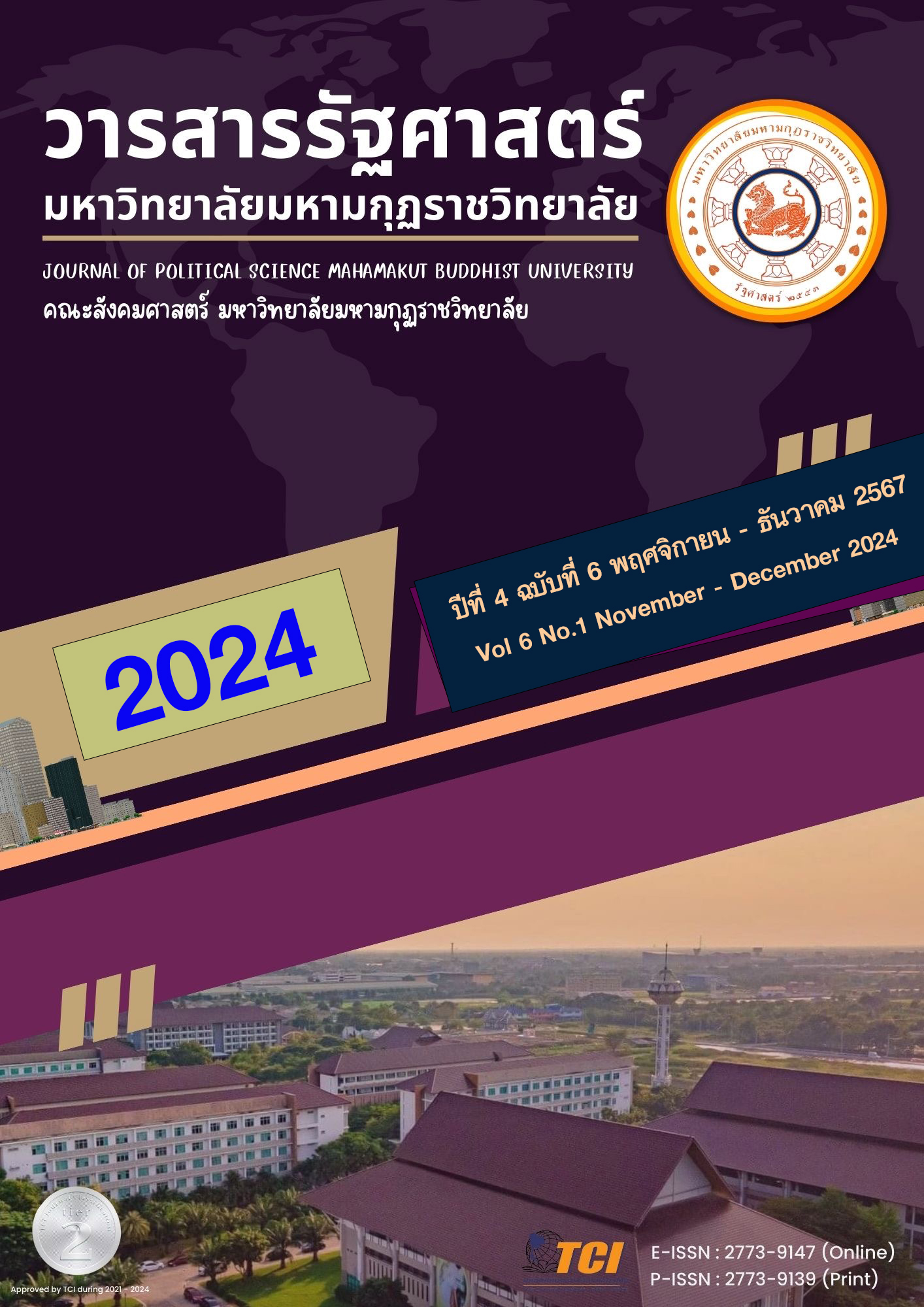BUDDHA DHAMMA : CONFLICT MANAGEMENT IN ORGANIZATIONS
Main Article Content
Abstract
Nowadays, organizations encounter various challenges which affect their internal quality development. Internal conflict is one of organizational challenges caused by unclear communication or misunderstandings among stakeholders. This article proposes a guideline to deal with internal conflict by applying Buddhist principles, which place importance on fostering understanding and compromise to create productive working environment. The integration of Buddhist principles into conflict management can reduce organizational obstacles and enhance positive relationships within the organization.
This academic article aims to study the approach to conflict management in organizations by applying Buddhist principles to solve problems in society. Buddhist principles emphasize self-understanding and considering the true causes of conflict, including the use of wisdom to solve problems, especially the principles of the Four Noble Truths and the Four Divine Abodes, which can be applied to conflict management and can create an environment that promotes cooperation and understanding within the organization. Besides, it also develops the quality of communication and interpersonal relationships in the organization to become a happy organization. Therefore, this article presents the basic concepts of Buddhism related to conflict management, analyzes the factors and causes of conflict in organizations, and suggests methods for conflict management using Buddhist principles to create understanding and concrete application of such approaches in working life. The findings revealed that after applying Buddhist principles such as the Four Noble Truths and the Four Divine Abodes to manage organizational conflicts, the interpersonal understanding and compromise within the organization were developed, leading to productive working environment, effective communication, and positive relationships in workplace.
Article Details

This work is licensed under a Creative Commons Attribution-NonCommercial-NoDerivatives 4.0 International License.
References
คณิต ดวงหัสดี และพระมหามิตร ฐิตปญฺโญ. (2564). พุทธบูรณาการจัดการความขัดแย้งเพื่อสันติภาพ. วารสารบัณฑิตศึกษามหาจุฬาขอนแก่น, 8(2), 3.
เจริญชัย กุลวัฒนาพร, (2564), การประยุกต์ใช้หลักพุทธธรรมกับการบริหารจัดการความขัดแย้งในองค์กร, วารสารวิจยวิชาการ. 4(3). 294.
นารีรัตน์ อนุรัตน์. (2556). การบริหารความขัดแย้งของผู้บริหารในโรงเรียนตามความคิดเห็นของครูในอำเภอบ่อทองสังกัดสำนักงานเขตพื้นที่การศึกษาประถมศึกษาชลบุรี เขต 2. ใน วิทยานิพนธ์คณะศึกษาศาสตร์. มหาวิทยาลัยบูรพา.
ประภาวัลย์ บุญญานภาพันธุ์ และพระมหาอุดร อุตฺตโร. (2565). ภาวะผู้นำกับการแก้ไขปัญหาความขัดแย้งในองค์กรโดยหลักพุทธสันติวิธี. วารสารมหาจุฬาวิชาการ, 9(3), 6.
พระธรรมปิฎก (ป.อ. ปยุตฺโต). (2566). สลายความขัดแย้งเข้มด้วยปัญญา. (พิมพ์ครั้งที่ 9). กรุงเทพมหานคร: บริษัท โอ.เอส.พริ้นติ้ง เฮ้าส์ จำากัด.
พระมหาหรรษา ธมฺมหาโส. (2557). พระพุทธศาสนากับวิทยาการสมัยใหม่. (พิมพ์ครั้งที่ 3). กรุงเทพมหานคร: โรงพิมพ์มหาจุฬาลงกรณราชวิทยาลัย.
_______. (2561). พุทธสันติวิธี: การบูรณาการและเครื่องมือจัดการความขัดแย้ง. (พิมพ์ครั้งที่ 2). กรุงเทพมหานคร: หจก.ประยูรสาส์นไทยการพิมพ์.
มหาจุฬาลงกรณราชวิทยาลัย. (2560). พระไตรปิฎกฉบับภาษาไทย ฉบับมหาจุฬาลงกรณราชวิทยาลัย. กรุงเทพมหานคร: โรงพิมพ์มหาจุฬาลงกรณราชวิทยาลัย.
ราชบัณทิตยสถาน. (2542) พจนานุกรมฉบับราชบัณทิตยสถาน พ.ศ. 2542. กรุงเทพมหานคร: บริษัทอักษรเจริญทัศน์.
รัฐพล เย็นใจมา และสุรพล สุยะพรหม. (2561). ความขัดแย้งในสังคม: ทฤษฎีและแนวทางแก้ไข. วารสาร มจร สังคมศาสตร์ปริทรรศน์, 7(2), 230.
สมเด็จพระพุทธโฆษาจารย์. (ป.อ. ปยุตฺโต). (2561). พุทธธรรม ฉบับปรับขยาย. (พิมพ์ครั้งที่ 19). กรุงเทพมหานคร: สำนักพิมพ์ผลิธัมม์ ในเครือ บริษัท สำนักพิมพ์เพ็ทแอนด์โฮม จำกัด.


